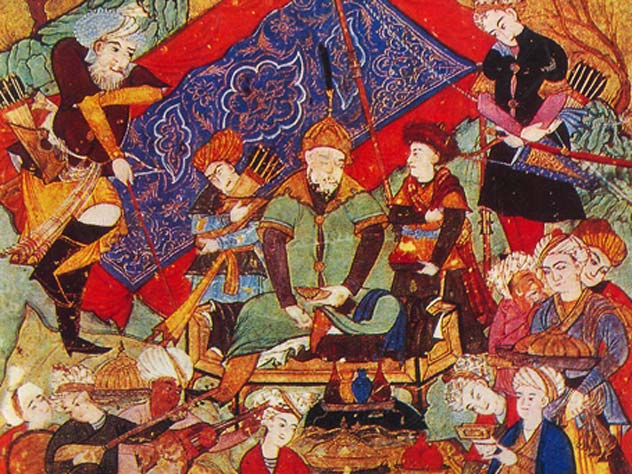The great Central Asian ruler Tamerlane died at the age of 68. The age for the Middle Ages is decent. However, «lame Timur» was not going to visit Allah. Death caught him on the way to the greatest and bloodiest conquest he wanted to make. Where was Tamerlane’s untold army moving? And why did he die without bringing it to the goal? Let’s try to make sense of it.

The most famous image of Tamerlane (1336-1405)
During his long life, Tamerlane conquered many countries. But with one of them he tried to maintain peaceful relations. That country was China, where the Ming emperors ruled after the overthrow of the Mongol Yuan dynasty in 1368. Sources indicate that Tamerlane formally observed vassal dependence on the Ming dynasty, but at the same time felt humiliation, bowing before the puppet emperor.
The decision to conquer China matured gradually. For the first time «symptoms» appeared when once, receiving ambassadors in Samarkand, Tamerlane publicly told a Chinese diplomat that «he was the ambassador of a bandit and his personal enemy». As Tamerlane’s biographer Jean-Paul Roux writes:
«The self-love suffered when sending another embassy, the almost mystical longing for China, the demand for the return of the entire Genghisid inheritance — these are the reasons why Timur conceived another campaign».

Timur Plots War with China
Readiness №1
Timur used to say quite often that battles were won by the will of Allah, and the number and armament of the troops had nothing to do with it. This time he changed his mind. He is credited with the phrase that the war with China can be won only by having «great power». To that end, he created the largest army he had ever commanded. It numbered between 100,000 and 200,000 horsemen, hordes of infantry, and an endless string of vehicles.
On Timur’s orders, a thorough «cartographic» and preparatory work was carried out. Inventories of roads were made, climatic conditions and resources of the countries through which it was necessary to go were studied. A lot of peasants were sent in advance under reliable protection to grow wheat along the planned roads in those places where bread growing was possible. In Otrar, Almalyk and Turfan large warehouses of provisions were arranged. Thousands of milking camels accompanied the army on the march to give the soldiers food and milk. On 500 wagons felt tents moved towards China. The soldiers were dressed in warm clothing that withstood the piercing winter cold.
«Never before had he been so well prepared,» writes Jean-Paul Roux, «and no one up to the new times had been so thoroughly engaged in it as he.
Timur had everything he needed to conquer China, but unforeseen circumstances interfered with his plans.

Timur the Conqueror (another version)
Why Samarkand Conqueror Died
The Great Emir set out on his campaign on December 27, 1404, in winter, as he always liked to do. The gigantic army confidently went forward. Timur expected to pass Central Asia in three months. In January, he made a stop in Otrar, where he felt ill.
Although Timur was already old, he still counted on his iron health. Not so long ago he could feast from dinner till morning, drink and eat more than the most gluttonous guests and indulge in carnal pleasures. And now he arrived at the «party» given on the day of departure of princesses and princes to Samarkand.
The feast took place on January 12, 1405. In the midst of the fun (or maybe earlier or later) Timur felt bad. He was overcome by the strongest fever, and the great emir was put to bed. For weeks he was delirious, and in moments of enlightenment prayed for his soul, not forgetting to listen to reports about the army and his family. January 19, Timur realized that his days are numbered, and appointed his grandson Pir-Muhammed as heir.

The Great Conqueror
P.S.
The sources that tell about the life and death of Tamerlane do not give a definite answer to the question of why he died. On the one hand, we can assume that the great emir had a strong inflammation of the lungs, which Timur treated in the traditional way for a warrior and a drunkard: instead of antibiotics, he injected into himself shocking doses of alcohol.
On the other hand, it is possible that the disease was not so strong, and the amount of alcohol taken by Timur at the feast was off the scale. Some historiographers directly point out that the great emir simply lost count of the bottles and died of overdrinking.
As we can see, both versions of the explanation converge on the fact that a lot of drinking is harmful, and in old age, deadly dangerous. Timur did not take this into account, but the Chinese were happy and jumped to the skies.
